Frank J. Beitel Lumberyard
Joseph Beitel made the journey from Germany in 1890, to start a new life inTexas. His family helped establish the lumber industry in the southwest United States. Joseph’s son Frank founded a lumberyard on East Commerce Street in San Antonio. When the SA&AP railroad decided to make Kerrville the last stop on its line, he came here and purchased “two acres of land more or less” along the tracks to establish a new yard. That lumberyard operated continuously for 103 years, making it one of the oldest yards in Texas.
When Mr. Du Menil sold the property to Mark and Linda Stone in 2007, it underwent a major renovation including taking down the lumber bins (because they were not built on foundations, the bins could not be saved). The salvaged structure is now called The “Old House” of Beitel and used as Rails Events Hall for catering, business meetings and other special events.
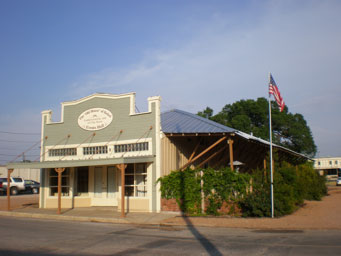
Business Name Changes
- May 6 1889 - Frank J. Beitel Dealer in Lumber, Doors, Sash, Blinds, Cedar
- December 1912 – Kerrville Lumber Co.
- October 22, 1941 – E.E. Saenger Lumber Co., Inc.
- 1947 – Parker Schreiner Lumber Company
- November 2, 1959 – Simms Moore Lumber Company
- 1965 – Hill Country Lumber & Hardware Co. Inc., Owner Gus Du Menil
- 2007 – The “Old House” of Beitel
Albert (Alley) Beitel Jr.
Click to toggle additional content...
Kerrville Times - 1933
Kerrville, Kerr County, Texas
Ally Beitel, 44, Kerrville Civic Leader, Is Dead
Prominent Business Man of City Laid to Rest Monday Afternoon
Hundreds of sorrowing friends Monday afternoon joined in a final tribute to Ally Beitel, 44, prominent Kerrville business man and civic leader, who died at a hospital Sunday at 4:30 p.m. following an extended illness. The last rites were held from the First Presbyterian Church, with Rev. Paul S. Van Dyke, the pastor, officiating. Burial was in Glen Rest Cemetery under direction of Peterson’s Funeral Home.
Active pallbearers were: Dr. H.Y. Swayze, S. Eastland, W. Scott Schreiner, A.C. Schreiner, Jr., Charles Rawson and E.H. Prescott. Honorary pallbearers were commissioned officers in the cadet corps at Schreiner Institute.
Kerrville’s deepest sympathy was reflected by the long cortege that followed the earthly remains of Ally Beitel to Glen Rest, and the great profusion of flowers banked high upon the mound stood out as mute evidence of the esteem he had gained during his years of tireless service to the city and its institutions.
Mr. Beitel had been in failing health for several months and recently underwent three operations, the last one Friday; but the best medical skill proved unavailing and a courageous fight to regain his health was lost when he passed away Sunday afternoon.
The city has had few citizens who were identified with so many lines of civic endeavor as was Ally Beitel. He was an indefatigable worker for any cause that he championed and his optimistic nature often inspired those with whom he was associated.
All Beitel was born in San Antonio, August 29, 1888. After receiving his education in schools of that city, he became associated with his father, the late Albert Beitel, in the lumber business. The firm maintained a number of retail yards in Southwest Texas and Ally Beitel came to Kerrville in 1909 to accept employment in the branch yard here. He later became the directing head of the business and during his 24 years residence in the city filled many positions of honor and trust.
He was past president of the Rotary Club, past president of the Chamber of Commerce, past president of the Kerrville Country Club and past master of Kerrville Lodge No. 697, A.F. & A.M. At the time of his death he was a member of the Schreiner Institute board of trustees, a member of the City Water Board and an officer of the First Presbyterian Church. He served as County Commissioner of Precinct No. 1 from 1922 until 1926.
Surviving are his widow, Mrs. Freddye Beitel and three daughters, Mrs. C.R. Gordon of Mathis, Miss Geraldine Beitel and Betty Jo Beitel, Kerrville. Other survivors include two sisters, Mrs. E.L. Penalosa of New York City and Mrs. Helen Thurman of San Antonio; five brothers, Roy M., Jesse J., Frank O., George D., and R.L. Beitel, all of San Antonio.
Below is an excerpt from a book about Ally Beitel's father, Albert, and the connection to Frank J. Beitel and lumberyards in San Antonio.
A Twentieth Century History of Southwest Texas, Volume 1
by Lewis Publishing Company 1907
Albert Beitel, who is engaged in the lumber business in San Antonio, his native city, was born in 1856, and is a son of Joseph Beitel, also a native of Germany, who died in San Antonio in 1890. The family was founded in this state at an early period in it's development and progress, and the name Beitel is intimately associated with the history of the lumber business in the southwest. The The business with which Albert Beitel is now connected was established by his eldest brother, Frank J. Beitel, now deceased, in San Antonio, in 1963, The yards being located on East Commerce Street about where the Ludlow House now stands, from there the yards were removed to North Flores Street, and in 1878 to the Sunset Depot and in 1880 to the present location on Commerce Street near the I. & G.N. Depot. The founder of the business passed away in 1899. For a number of years the firm name was F.J. Beitel and Company but after the death of the founder the business reorganized under the name of the Beitel Lumber Company. Roy M. Beitel, son of Albert Beitel, is also a member of the firm and is now manager of the San Antonio office. In addition to the plant in San Antonio the firm has a large yard at Kerrville and is in every way a prominent and representative institution of the lumber industry in Texas. Pages 471 & 472.
Robert Saenger
Click to toggle additional content...
Robert Saenger ran the lumberyard in partnership with H. V. Scholl. Later Roberts son Emile owned the yard and named it E. E. Saenger Lumber
The Kerrville Times Volume 43 Kerrville, Kerr County, Texas, Thursday, Nov. 8, 1951 Pioneer Kerrville Merchant, Robert Saenger, Sr., 86, Dies Thursday; Services Friday at Zion’s Church
The community grieves today over the loss of one of its most respected citizens and pioneer merchant, Robert Saenger, Sr., 86, who passed away quietly early this morning in Sid Peterson Memorial Hospital. He had been a patient only a few days, following a stroke Monday at his home, 624 Clay Street.
Funeral services will be held Friday afternoon from the Zion Lutheran Church at 2:30 o’clock with the Rev. Walter C. Probst officiating. Interment will be in Glen Rest Cemetery under direction of Smith Funeral Home.
Pallbearers will be Hilmar Pressler, Emil Baethge, Victor Pressler, John Klingemann, Charles Arnecke and Leroy Brehmer.
A native of Fredericksburg, he was born January 18, 1865. He grew to manhood and came to Kerrville before the turn of the century 62 years ago. Entering the grocery business he operated his store during the early growth of Kerrville and the development of the Hill Country. During recent years, and in failing health, Mr. Saenger continued to operate a small neighborhood store adjacent to his home on Clay Street, and was always alert to the fast-moving events of the community and national affairs.
He was preceded in death by his wife, August 26, 1933.
Survivors include seven children, E.E. Saenger of Kerrville, Robert W. Saenger of Little Rock, Ark., Herman Saenger of Fort Stockton, W.F. Saenger of Houston, A.A. Saenger of Kerrville, Mrs. Garland Weisiger of Houston, and Mrs. Guy G. Griggs of Kerrville; a brother, William Saenger of Fredericksburg; six grand-children and five great-grand-children.
The Story of an Old House
Click to toggle additional content...
Milburn Beitel has a copy of a book that was given to him by his great aunt and generously shares it with us. It tells a little of how his family came to Texas. Enjoy!
Have you, somewhere in your rambles about the world, seen an old house that impressed you with its dignity, and fixed itself so firmly in your mind that you could see it long afterward, and ponder upon the structure and its history?
These things appear a bit peculiar to us when we first think of them, but there is nothing that holds a more important place in psychology, than an Old House. Not a tumble down ruin, in which nothing but bats and crickets and ghosts of the past will dwell, but a dignified, staunch old house that reflects the character of it founder, that has weathered the storms of many winters, and the blistering heat of as many summers.
Often one stands before such an old structure, looking at its grim and stately front, the gnarled trees about its doors, the quaint old windows that glint in the sunlight with their tiny panes, and as he does so is almost constrained to remove his hat as in an honorable presence. This is no fancy, it may be a fact that has escaped the notice of the psychologist, but it is a fact nevertheless. Age is honorable in men, because in most cases it denotes an honorable and an upright life. The man who lives a life of dissolute habits rarely lives to be old.
The Old House is likewise a symbol of uprightness and care. The master dreamed of it in his youth, perhaps, and when he reached man’s estate builded it with care of mature judgment, and the manly strength of his early years. From time to time he improved, beautified and adorned it, and added to it the comforts and the ornaments that make houses homes. This Old House saw the first happy days of a bride and groom, who with a smile on their lips and a song in their hearts came to make it home. A few years later it heard the prattle of a little child, and anon the silvery laughter and gladsome shouts of children at play within it’s halls. On a day the wedding bells voiced a new found joy, and at another time the slow, muffled step is on its stair, and the stifling smell of cut flowers is its hall. Staunch, old grey pile, thou wert builded wisely. You have seen all the griefs and sorrows that befall man, froma broken toy to a broken heart, from a wedding day to a mother’s pride in a noble son, or a good and virtuous daughter. The winters tempests have made their fierce onslaughts upon your walls, and capricious moods of spring have hurled bolt and debachle about your doors and yet you shook not.
Consider the pictures the Old House has seen. On a day when snow lies like a mantle of virtue over the earth, when the sun, shining through the icicles on the eaves, turns their prisms into a kaleidoscope, and makes the world a seeming fairy land. Night comes, the lowing cattle seek shelter of the spacious and inviting barns, the fowls seek their roosts, while the peacock, that fearless king of winter’s storms, wrapped in his coat of gaudy feathers, huddles on the “comb” of the Old House, close beside the wide chimney upon which he is wont to sit in grandeur in the summer time, and with his breast turned defiantly to the chilling blast settles himself to rest for the night.
It was Christmas Eve, no night bird called. The shadows came, but found the earth in a shield of white, while stars twinkled the story of Bethlehem’s hour, and they slunk away, as sin gives way to virtue. We have viewed the dignity of the Old House, its indefinable air of security and integrity, from without; come now, and let us softly raise a corner of the curtain, and look within at the picture. Ah, does it not make our hearts bound with gladness to know that there is so much of joy and of goodness in the world? Seated in an old arm chair, before the wide fireplace with its generous heap of blazing logs, sits the grey haired master of the Old House. Upon one knee is his own little granddaughter, with ringlets of gold and eyes of blue, while on the other side sits a crippled waif who, too weak to battle the storms of life alone, has found shelter in the Old House. The old man is telling them a Christmas story, and in round eyed wonder they listen to the tale. The great wood fire sputters and “treads snow,” and its ruby light transforms the golden curls into a halo, and makes brilliant sapphires of the wide blue eyes of the little girl; it softens the lines of the twisted limb and burnishes the shallow face ot the orphan boy until it makes of him a classic statuette of patience, admiration and gratitude. And the master of the Old House, the firelight on his rugged face and shaggy grey hair increases the lights and shadows, and makes of him in the stillness a statue of benevolence and manly virtue. Over by the candle sits the good wife, peacefully knitting a little sock for the crippled child, and the while contemplating the picture before her. A tiny stocking hangs on each end of the mantle, ready for Santa Claus who will come down the wide chimney anon, and opening his wonderful pack fill them to overflowing with presents. Is it not a beautiful picture? Let us drop the curtain and tiptoe away, leaving them to their joy.
There are many other pictures of the Old House. Look at the old road that leads around the hill and approaches its door. Think of the times that the master of the Old House has come along that road at the close of a day of honest toil. Think of the times that the friend in need has come along that same road, and of the beautiful story that tells you that he never went away empty handed.
And again, of the day that the violets were in the hedge row, and the blue skies of spring were laughing at you from a glassy pool in that brook, as a youth and a maid strolled along that same old road, and on toward the Old House talking of their approaching wedding day.
Look again, and the scene has changed. The way is strewn with stones, gashed with ruts and scarred by wheels. It is night, the stars are hid, and darkness wraps the earth like a sticky pall of weeping sadness. A lone light burns in a window of the Old House on yonder hill, like a blessed beacon of hope. Hist! Who comes there? Ah, ‘tis the old family doctor, going again to the Old House to visit the little sick child. The scene shifts, and morning comes again, the sun breaks over the hill and dale in all its glory and splendor. An industrious hen is scratching in the door yard for her lusty brood, a watch dog barks, and as the wayfarer looks about him the very air of the Old House seems to say to him “ I am old, tried and true. Many others have been builded upon weaker foundations than mine, and they have passed away, but my master builded me wisely, my girders are strong and my rafters staunch. Year have flown as swallows skim by in the gloaming, but still I stand and offer you comfort and cheer.
Have you never had such a feeling as this when you stood before an old house with its worn door stone, over which countless thousands had passed? Do not aged things often impress you so? Not alone, old houses, old mills, but countless other things whose firm establishment makes them a part of human history. In this country, with its youth of a few paltry centuries, there are of course no places that would attract the archaeologist, but still things are old, or young, by comparison. In this nation are many things that are very old by comparison to the age of the nation; in Texas there are some things that are old by comparison to the age of the state. The early settlers of Texas and the institutions they founded, the trails and hardships they endured, and the final successes they achieved, furnish a theme of romantic beauty in the telling that outrivals the fabled songs of ancient heraldry, and the mystic legends of the Orient.
We have in mind an “old House,” in this state, and in part of the state, that was builded wisely. Founded by a man in his youth, strengthened and adorned in his prime, and when he departed as the master of a house going on a long journey, left it as a heritage for those who came after him to perpetuate and perfect.
Nearly a century ago, in the little village of Baden-Baden, Germany, there dwelt a boy and a girl. The village, with its narrow streets and quaint, tall houses, was built upon a steep spur where the great Black Forest ran down and stood upon an eminence overlooking the junction of the rivulet of Oosbach and the river Rhine. Here in the borderland of the mystic Black Forest, where thrilling fact and weird legend of the forest were told to children of the village when they were gathered around the cottage hearths at evening, this boy and girl were imbued with the spirit of adventure. Here they passed their childhood, sang and danced through the fleeting years of youth, and on a happy day plighted their troth.
Stories of adventure by land and by sea had lured the young man to America. He bade his sweetheart goodbye, and left her to sit on the terraces of her native village and watch the lights come and go that kissed the vineyards into ruby flame, turned the rives and the lakes into silver mirrors, and deepened the shadows of the great forest until its avenues faded into mystic darkness.
The young man landed at Philadelphia, the country was at peace, the city at that time had a population of more than eighty thousand, boats plied peacefully upon the Schuylkill, and the land of adventure was not yet in sight. He heard strange tails of the West, and felt its call. There came a day when the longing for the playmate of his childhood, for the sweetheart of his youth, and for the plighted bride he had left behind grew strong in his heart and battled with the spirit of adventure. He decided to send for her, and when she came he and his maiden would wed, and they had gathered flowers together in their infancy, danced around the maypole in their youth, and stood pensively watching the sun at evening as it sank like the mystic golden apple into the sea far beyond the sunny slopes of France, would be married, and hand in hand would turn their faces again to the West, and journey to the true land of adventure and of golden opportunity – the new Republic of Texas.
With the intrepid spirit of adventure that actuated the men and women who made America the greatest and most wonderful of all the nations of the earth, and those who made the Lone Star state the Golden Empire of the West, this young couple left the Quaker City in the early part of the year 1830, as soon as there was grass for the ox team to eat on the way, and traveled the entire way from Philadelphia to the little settlement at the junction of White Oak and Buffalo, which six years later became the village of Houston, and the seat of government of the Republic of Texas. They made the journey all those weary miles in an ox wagon, over untrod wilderness by far the greater part of the way. A few months later, answering the call, “further west,” they loaded their scanty accumulation of household effects into the old ox wagon and journeyed still westward to that beautiful section of Texas, where the town of Lockhart now stands. Still looking for the ideal spot in such a boundless field of splendid opportunity, they finally went a little further westward, and settled on a stream about eight miles south of San Antonio, which took the name of Beitel Creek from the ranch of Joseph Beitel, and is so called to this day. There was established the Beitel Ranch which grew to be one of the formost ranches of the section, in its time.
To Joseph and Elizabeth Beitel were born ten children, five sons and five daughters. The sons of the House of Beitel were born and reared in the wide places of Texas. They were herdsmen from their infancy, and as they grew to manhood gathered their cattle, like Abraham of old, “from a thousand hills,” and drove them sometimes a thousand miles through lands beset by dangers from red men and desperadoes to the marts of men for sale. At the age of 14 years, Albert Beitel, the present head of the house, took a herd of cattle from the plains that surrounded the village of San Antonio de Bexar, to Hastings, Nebraska. The lad for a general, and the cowboys for an army, the long march was made and they “delivered the goods,” and returned safely. The sons of the House of Beitel were men who did things. Taught the philosophy of life from the book of nature, and trained in the ways of men who formed the vanguard of American progress, they were men of action, men of prompt decision and mature judgement, and of that wide knowledge that tends to progress and success.
The House of Beitel was a house of the South and after more than a quarter of a century upon the liberty loving plains of Texas, Joseph Beitel, born a patriot in another land, was a lover of his country, and of her institutions. In 1861, when the cannons that reduced Sumpter reverberated through the land, drums rolled and bugles called to war, Joseph Beitel called all the sons of his house about him except Albert, his youngest, then a little boy. He bade his family goodbye, commended them to the God of mercy and justice, and marched away with his sons to where glory beckoned beneath the stars and bars of the Confederate flag.
Shielded by the hand of Providence, when the war was over, wounded and weary, they all returned to their home. The sons of the House of Beitel were Charles, Rudolph, Frank J., Henry and Albert.
Returning to the old ranch, and to the city of San Antonio, after the war, Frank J. Beitel conceived the idea of engaging in business. Four years in the army had broadened his view of things, had given him a realizing sense of what Texas was destined to be. He believed that railroads would be built into San Antonio, that the plains of Texas would become a producing country, that American progress would unlock the door to this great storehouse and that the world would recap a rich harvest. Realizing that progress would bring building, he decided to engage in the lumber and building material business, and accordingly in the 60’s soon after the close of the war, he opened a lumber yard in San Antonio, on Alamo Street, about where the Plaza Theater now stands. Thus was founded the Commercial House of Beitel in Texas.
The story of the lumber business in Texas at the time reads like a romance. In the first place, with all her wonderful forests of pine, Texas did not produce any lumber at that time. The lumber used in San Antonio then was sawed in the mills of Florida, conveyed thence in barges to the coast of Texas at Port Lavaca and Indianola. It was then carried overland to San Antonio by ox teams and it required months for the wagon trains to complete a single trip. The was of the finest quality of Florida pine. Upon each piece was branded with a hot iron the length, width, thickness and the number of feet contained therein, and the name of the dealer to whom it was consigned.
Owing to the scarcity of lumber and its very high price, San Antonio was at that time a city of adobe houses, many of which are still standing. As the House of Beitel made it possible for builder to secure lumber, the better class of houses were constructed of it. In tearing away old building in San Antonio today, for the purpose of giving place to modern sky scrapers, workmen frequently come across timbers that bear the brand “F.J. Beitel” or “Beitel Bros.”, that have served their purpose well for half a century, and are still sound and true, because they were “honest goods” whenthey were put there, and are symbolic of all dealings of the house of Beitel.
Subsequently, in order to secure a location more in the center of the building activities of the town, the yard was removed to the corner of North Flores and West Houston Streets. In 1876, when the Southern Pacific Railroad began to put out its iron bands that were to link the active, bustling East to the Golden Gated of the West, F.J. Beitel, ever alert to the call of progress, established yars at the termini of the advancing railroad, first at Kingsbury, and as the road advanced, at Old Marion, New Mrion and at last with the advent of the railroad into the Alamo City, at the Sunset Depot. The purpose of these yards was not only to supply the needs of the people of the country that was being developed by the advancing railroad, but also to receive lumber and builders’ supplies by rail and forward it to the mother yard at San Antonio. When the yard was established at Kingsbury, Albert Beitel, the present head of the House of Beitel, who had been the little boy that could not go to war because he was too small to shoulder a musket, had reached man’s estate, and at the age of 20 years was placed in charge of that large business, followed the road into San Antonio establishing yard after yard as the road progresses, and had charge of the yard at the Sunset Depot until 1880, when with the advent of the International & Great Northern Railroad better facilities were offered in the vicinity of it depot, and F.J. Beitel consolidated the two yards at the corner of West Commerce and Medina Streets, where it has been conducted for the last thirty-one years.
On the 7th of January, 1898, the Dark Angel summoned F.J. Beitel to go on the long journey from whence none return. Albert Beitel, the present senior member of the House of Beitel, purchased the business from his brother’s estate, and subsequently took into partnership his son, R. M. Beitel, now the junior member of the Beitel Lumber Company, unincorporated.
In 1886, when Ganahl, now Center Point, was the terminus of the Kerrville Branch of the San Antonio & Aransas Pass Railroad, the House of Beitel established at that place a branch yard. The following year, when the road was completed to Kerrville, the yard was removed to that place, and became a prosperous business. A year ago when a new manager was needed for the Kerville business there was another son of the House of Beitel, Albert Beitel Jr. who had been trained to the business under the discerning eye of the man who at the age of 14 could pilot a herd of cattle from Texas to Nebraska. Eminently qualified for the business both by natural ability and though training, Ally Beitel as manager, with his brother, Frank Beitel, as assistant, has charge of the Kerrville business of the Beitel Lumber Company.
The parent house, at San Antonio, is directed by Albert Beitel Sr., assisted by the eldest son and partner, R.M. Beitel, and also by the youngest, Jesse Beitel, who is the head of the clerical force.
Thus, the House of Beitel, now nearing a century since that bride and groom, Joseph and Elizabeth Beitel, crossed the boundary of Texas in an ox wagon on their honeymoon trip, is still the House of Beitel.
It is an “Old House,” founded upon sills of flawless timbers of business integrity, with girders of the heartwood from forests of justice and fair dealing, and rafters from flexible but unbreakable fibre of the wood of the Golden Rule.
The master of the House of Beitel meets no man with blare of trumpets and glitter of pomp and pageantry at the draw bridge of his castle, but a Texas born, a child of wide places, he stands upon the level with all good men and true, and meets the world squarely, man to man; not only this, but all the sons of the House of Beitel are trained in the same way.
These men are in the lumber business for profit, but that is not all. They have a love for the honor of the House of Beitel, the Old House, and they stand at its door and extend a welcoming hand to all who enter, and say for the House of Beitel, “I am old, tried, and true. Years have passed, as swallows slim by in the gloaming, but still I stand, and offer you comfort and cheer.”
Old Letters
Click to toggle additional content...
When we started working on the old Lumberyard in 2007, we found many old papers in the attic space. Hundreds of personal receipts, ledger books, bundles of sales receipts and more. Gus Du Menil, who had owed the business and building since 1965, had also found some interesting things. Among those was a group of letters that he gave to us. The earliest one we have is dated February 15, 1890. Here are six old letters. Look at the postmarks as we glimpse into the past.
"Be a Better Boy"
February 15, 1890
H.V. Scholl
Kerrville, TX
Friend Henry
Yours of the 13th to hand and freight bills as well as your statement for shortage of sash- forwarded to B. F. & Co. for credit. I have looked over my files and I do not find any invoice for car #213 I. M. & S from anyone. However I guess the owner will turn up and if he does not why we are just that much ahead that is all ___ as for your great big ____ about 6” of snow, you must furnish us proofs as the boys say you either had the nightmare or else, measured a hole in the ground on the north side of the house. Go to Sunday school and try to be a better boy Henry.
--- Yours Ally
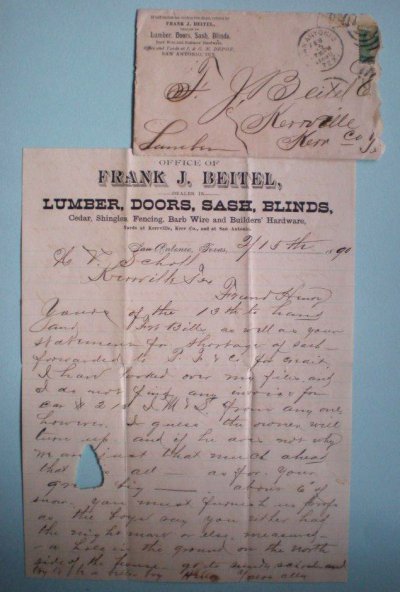
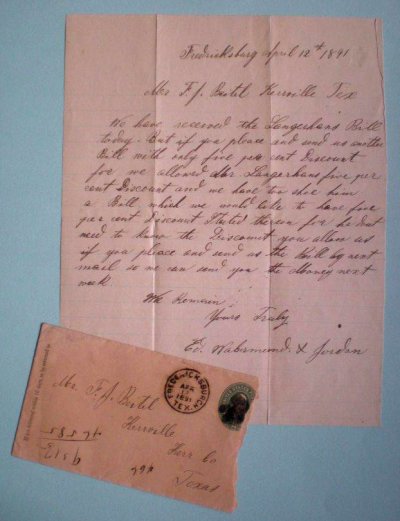
"The 1891 Kick Back"
To: Mr. F. J. Beitel
Kerrville Kerr Co Texas
Postmark: Fredericksburch Tex.
Apr 12, 1891
Mr. F. J. Beitel Kerrville Tex
We have received the Langerhaus bill today. But if you please and send us another bill with only five percent discount for me allowed Mr. Langerhaus five percent discount and we have to show him a bill which we would like to have five percent discount stated theron for he don’t need to know the discount you allow us if you please and send us the bill by next mail so we can send you the money next week.
--- We Remain Yours Truly,
--- E. J. Wahrmund. X Jordan
"An Estimable Lady Schoolteacher"
To: Henry V. Scholl, Esq.
Kerrville Texas
Postmark: Fredericksburch Tex.
Apr 12, 1891
Dear Sir:-
Allow me to address you as Alderman of the City of Kerrville. I believe you are in need of two or more assistant teachers for the coming school session.
Miss Matty Wiley of Fredericksburg is trying to secure a suitable position as teacher and is going to apply for a place in Tivy High School. Miss Mattie who studied under me for one year is an estimable lady, well qualified to teach any branch in the common school course. She is thorough, painstaking and of an amiable disposition, and although she has had no experience in teaching I feel sure she will make an excellent teacher. She is fully able to obtain a second grade certificate.
Anything you should do for her will be highly appreciated.
--- Respectfully Yours,
--- J. F. Roege
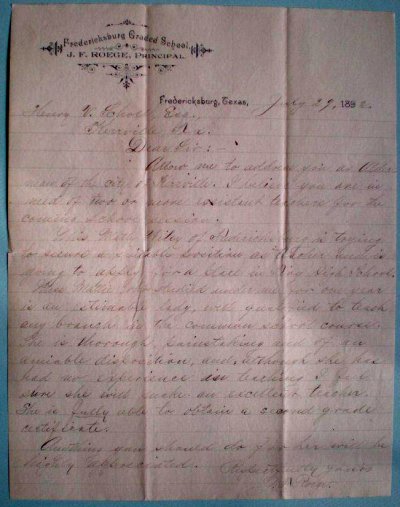
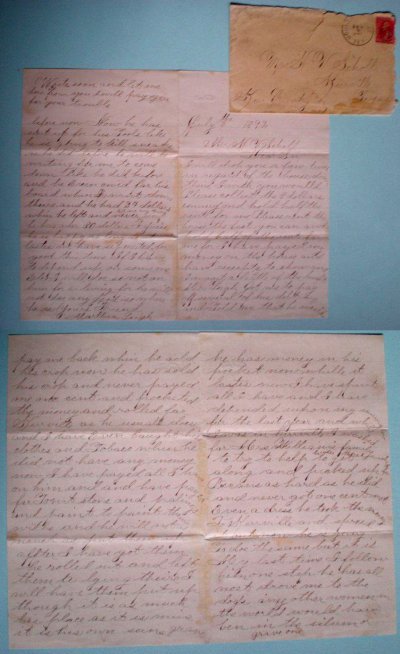
"He has almost drove me to the dogs!"
To: Mr. H. V. Scholl
Kerrville Texas Kerr County
Postmark: Mountain Home Tex
On July 9, 1892
Dear Sir,
I will drop you a few lines in regards of the house down there I wish you would please collect the 8 dollars coming and hold half the rent for me. Please rent the house the best you can and hold half of the rent for me for I have paid my money on the house and have receipts to show and I want a little of the benefit. Mr. Leigh got me to pay off several of his debts and told me that he would pay me back when he sold his crop. Now he has sold his crop and never paid me one cent and pocketed the money and rolled for Kerrville as he usual does and I have even bought his clothes and tobacco when he did not have any money. Now I have paid all I have paid on him and have paid for front stone and railing and paint to paint them with and he will not as much as put them up. After I have got them he rolled out and left them a lying there. I will have them put up though it is as much his place as it is mine it is his own son's grave. He has money in his pocket now while it lasts now I have spent all I have and I have depended upon my son-in-law for the last year and while I was in Kerrville I washed for Mrs. Williams family, besides others I washed for, to try to help to get along and picked up pecans as hard as he did and never got one cent not even a dress. He took the money to Kerrville and spread it out. Now he is going to do the same but it is my last time I follow him one step, He has all most drove me to the dogs. Any other women in the world would have been in the silum or grave one.
Write soon and let me hear from you. I will pay you for your trouble. Now he has sent up for his tools like he is going to kill snakes as he did before. He will be writing for me to come down like he did before and he even owed for his board when I went down there and he had 34 dollars when he left and never left me anything. Now he has near 80 dollars I guess he is happy as long as it lasts. We have separated for good this time. If I have to depend up on someone else I will do so not on him for a living. For he will not do any good so where he is.
--- Yours Friend,
--- Marthia Leigh
"Schmidt’s Hotel"
To: Mr. F. J. Beitel
Kerrville Texas
Postmark: Fredericksburg, Texas
August 9, 1892
Dear Sir,
Having secured the advertising privilege on the solid board fence of the Fair Grounds which is situated on the main road from here to Kerrville I beg to call your attention to the fact that it is an excellent place to advertise on and I could give you any space you want at very reasonable rates and would take it out in trade.
An early answer will oblige
--- Yours very respect.
--- W. W. Corley
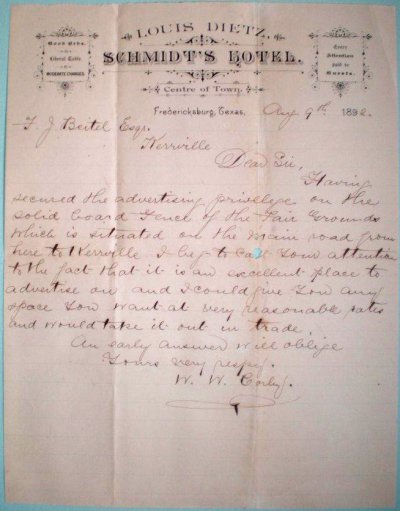
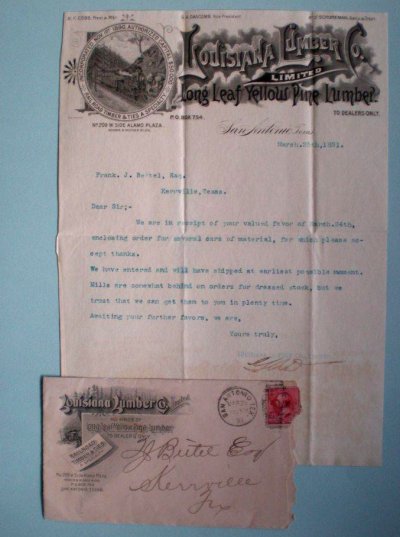
"Louisiana Lumber"
To: Frank. J. Beitel, Esq.
Kerrville, Texas
Postmark: San Antonio Tex
March 26, 1891 3:30pm
Dear Sir;-
We are in receipt of your valued favor of March 24th, enclosing order for several cars of material, for which please accept thanks.
We have entered and will have shipped at earliest possible moment. Mills are somewhat behind on orders for dressed stock, but we trust that we can get them to you in plenty time.
Awaiting your further favors, we are,
--- Yours truly,
--- Louisiana Lumber Co., Limited
Chain of Ownership
Click to toggle additional content...
Abraham O. Beck & Wife Rebecca Eliza Beck of Boone County Indiana to;
Abraham O. Beck of Gonzales County Texas, January 1, 1856 for the sum of $500
"…All that certain piece parcel and tract of land situated lying and being in the County of Bexar State of Texas bounded and described as follows to wit: 640 acres of land originally granted to Benjamin F. Cage and known as survey No. 116 in section No. 2 situated on the Guadalupe River about 55 miles NW from San Antonio beginning at a cypress 12 inches diameter For the upper corner of No. 115 and the lower corner of this survey from which a cypress 11 in diameter bears N 55&2 4/5 vs another 10 in diameter bears S 32' E 2 4/5 vs hence N 45 E 3881 vs to a stake and mound thence W 45 W 950 vs to a stake and mound thence S 45' W 3719 vs to a stake on the bank of the river for the upper corner of this survey from which a live oak 15" in diameter bears N 51 ½ E 46 vs another 12" diameter bears W 30 E 37 3/5 vs thence down the river with it's meanders to the place of the beginning bearing marker Together with all and singular the sights numbers hence witht amulets and appurtenances to the same belonging as in any wise incident as appertaining to have and to hold all and singular the premises above mentioned unto the said Abraham O. Beck…"
(Linda Stone’s paternal Grandparents, Charles and Ilo Beck, lived in Ohio most of their lives but did live and work in Ft. Wayne, Indiana for a time. She may be a distant relative to the original land owners….maybe!)
Abraham O Beck of Gonzales County Texas to;
Joshua D. Brown of Gonzales County Texas
September 20. 1858 for the sum of $1500
Joshua D. Brown of Kerr County Texas to;W. B. Hendrix of Kerr County Texas
For the sum of $250 October 18, 1858
"…to wit Block No. 3 in the town of Kerrsville county and state aforesaid also the ½ block No. 111 in the town of Kerrsville County and State aforesaid excepting lot No. 13 in Block No. 3 that was deeded for a church and 100 feet square off of the front of lots No. 56 & 57 of said block No. 3 to have and to hold …"-1 to 16 except 13 (book A page 337)
W. B. Hendrix & Prudence Hendrix to;
L. S. Ballard for the sum of $500 December 20, 1858 (Book A Page 384)
C.A. Ballard & wife L.S. Ballard of Kerr County to;
Hance M. Burney of Kerr County
for $150 on August 17, 1859 (Book B Page 28)
W.D.C. Burney & wife Martha Burney of Kerr County to;
Frank G. Beitel of the city of San Antonio, Bexar County
for $800 on May 6, 1889
Hance M. Burney of Kerr County
for $150 on August 17, 1859 (Book B Page 28)
Frank G. Beitel of the city of San Antonio, Bexar County
for $800 on May 6, 1889
"…certain lot or parcel of real estate situated in the town of Kerrville Kerr County Texas, the same being part of original survey No. 116 in the name of B.F. Cage described as following to wit: The north east half of Block No. 3,in said town of Kerrville lying along and a joining North Street about 420 feet, and bounded on the north west by Clay Street and on the South East by Tchoupitalas Street, containing two acres of land more or less."(Book N page 422)
Signed by W.G. Garrett County Judge Kerr County Texas (Book B Page 28) or (Book N Page 422)
C.F. Beitel to Albert Beitel Sr. July 23, 1912 (Book 32 Page 177)
Albert Beitel Sr. to Beitel Lumber Company on March 13, 1919 (Book 37 page 50)
In 1922 Ally Beitel (Albert Jr.) assumes ownership and changes name to "The Old House of Beitel"
Affectionately called the "Old House", he died in 1933 at age 44.
Albert Beitel owned the yard; it was run by Henry V. Scholl and Robert Saenger,
Ally Beitel then owned it and sold to Robert's son Emil Saenger.
San Antonio & Aransas Pass Railroad Company to
the Beitel Lumber Company Track Aguit October 3, 1912 (Book 39 Page 527) filed September 24, 1921
12-1921 Beitel Lumber to Kerrville Lumber 11-14-1932 Kerrville Lumber to
Chas. Schreiner Bank for $9.500
Mountain Sun Obituary November 15, 1951; Robert Saenger worked for Beitel Lumber, later owned and operated the Mosel Saenger Grocery on Clay Street. Later he had a small community store in the corner of his yard on Barnett and Clay until his death. Fond of music, his home was one of the musical centers of the community. He loved nature, his yard and garden, his trees and flocks of pigeons.
According to article 1986- Established in 1888 as F.J. Beitel Lumber Company managed by H.V. Scholl in partnership with Robert Saenger Sr.. When Scholl died the business was taken over by Ally Beitel later sold to Emile Saenger, son of Robert, who renamed it E.E. Saenger Lumber Company. Sold in 1947 and named Parker Schreiner Lumber Company. Sold in 1958 to Kenneth B. Moore of Dallas renamed Simms-Moore Lumber Company managed by Gus Du Menil. He purchased the company in 1965 and the name changed again to Hill Country Lumber & Hardware Company. Gus changed the business to "Peddlers Square" opened May 29, 1993.
* Operated as a Lumber Yard from 1889 to 1993, 104 years!
L.A Schreiner a single man to Simms-Moore Lumber Company for $15,000, 5%
November 2, 1959 (Book 106 Page 285-6)
And for $15,000 September 3 1965 (Book 6 Pages 86-87)
Simms-Moore Lumber to Gus Du Menil 1965
Gus & daughter Debra Du Menil (Hill Country Lumber & Hardware Company) to
Mark & Wife Linda Karst Stone on July 2, 2007
The property then went through the major restoration to become the Events Hall you are standing in today.
